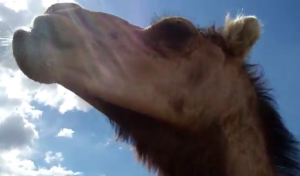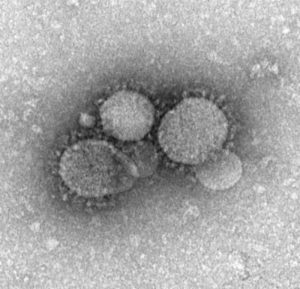New research out of Colorado State University (CSU) reveals that camels are the likely reservoir host that spreads the Middle East Respiratory Syndrome (MERS) virus to humans.

Image/Video Screen Shot
The research will be published in the December issue of the CDC publication, Emerging Infectious Diseases.
CSU, in collaboration with the NIH demonstrated that infected camels shed large amounts of MERS virus, primarily through their nostrils. They also established for the first time that the virus develops in the animals’ upper respiratory system, and that camels shed infectious virus for up to a week.
The finding are not surprising as previous research pointed to Dromedary camels as the source of the novel coronavirus (MERS-CoV)–also HERE and HERE.
“This is a necessary step in looking at the interaction between the virus and the host species, the camel,” said Mark Pallansch, director of the Division of Viral Diseases in the Center for Disease Control and Prevention’s National Center for Immunization and Respiratory Diseases.
“We don’t have an effective intervention for stopping the spread of the virus other than standard hygiene precautions and avoiding contact with infected individuals,” Pallansch added. “This does provide a possible intervention to keep the host from infecting humans.”

Danielle Adney, a Ph.D. student in CSU’s Department of Microbiology, Immunology and Pathology, was lead author on a study. Adney’s paper shows that three infected dromedary camels, housed at a CSU research facility, expelled high levels of MERS virus, mainly from the nose.
“It would be very surprising, given the amount they are shedding, if they were not able to infect other camels and humans,” said principal investigator Richard Bowen, a professor in CSU’s Department of Biomedical Sciences. “It strongly supports the theory of camels being the primary reservoir for this virus. Until this study, people knew infected camels shed some virus and carried it, but it was mostly circumstantial evidence.”
The animals with MERS overcame the virus within weeks, as if it were a common cold. The camels were cared for at CSU’s Animal Reproduction and Biotechnology Laboratory, and research tests were conducted in the university’s sealed Biosafety Level 3 Laboratory.
Now the CSU team is testing a vaccine that could keep camels from shedding the MERS virus, “The concept is to vaccinate the camels to protect the people,” Bowen said. “If this is effective, we’d have tools to vaccinate camels and prevent transmission from occurring.”
For more infectious disease news and information, visit and “like” the Infectious Disease News Facebook page
Globally, the World Health Organization (WHO) has been notified of 909 laboratory-confirmed cases of infection with MERS-CoV, including at least 331 related deaths.


2 thoughts on “Camels ‘vent volumes of the deadly MERS virus’: CSU researchers”